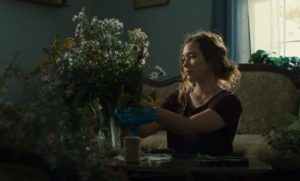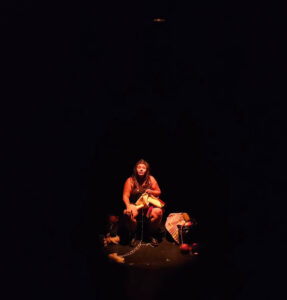sofia banzhaf
Ten years ago this past July Lee-Anne Poole’s play Splinters premiered at the Plutonium Playhouse (remember the Plutonium Playhouse?! All our theatres are ghosts now.) It featured Stephanie MacDonald, Vanessa Walton-Bone (Rest in Peace), Lewis Wynn-Jones, and Stewart Legere, and it was directed by Simon Bloom. It’s rare that an Atlantic Canadian play gets adapted into a feature-length film that opens FIN the Atlantic International Film Festival. It’s especially rare when that play began in one of Halifax’s small, independent theatres. Yet, here were are. Thom Fitzgerald’s adaption, Splinters, which boasts of an entirely Atlantic Canadian cast, had its Opening Night Gala at FIN on Thursday night.
The film Splinters, written, directed and produced by Thom Fitzgerald, tells the story of Belle (Sofia Banzhaf) who returns home to the Annapolis Valley from the city after the death of her father (Hugh Thompson). Belle and her mother, Nancy (Shelley Thompson), have a strained relationship because both are exasperated and alienated by the ways the other relates to concepts of gender and sexuality. When Belle came out to her parents as a lesbian when she was a teenager her mother responded with denial and disappointment. She has continued to try to shape Belle into her traditional view of what a daughter “should” be, with very little success. Since her father’s death, Belle sees her mother as helpless and judges her for how unprepared she seems to be suddenly facing the world without a man to guide her. Belle has an unexpected secret and his name is Rob (Callum Dunphy). For Belle, being the source of her mother’s dashed dreams while marching to her own drummer is preferable to making her mother happy while conforming to traditional roles. When Rob shows up at her mother’s house to support her during her time of grief Belle is still processing her father’s death, and now must consider the future of her relationship with Rob and decide whether to try to connect more ardently to her mother.
Fitzgerald’s pacing of the film is languid, not unlike the aimless stretches of time that often accompany profound grief. There are long stretches without words, suggesting a family where people spend a lot of time in their own heads and don’t have the tools to communicate with one another effectively. In fact, the sweetest show of affection shown to Belle by a family member is from her brother, Greg (Bailey Maughan) when they end up pushing each other into the mud flats. It looks like they’re fighting, but all their love and care is just below the surface. Throughout the film the characters keep finding different, imperfect, ways to try to connect. In the end there is one clear step forward, but beyond that, no tidy solutions in sight: as in life.
Shelley Thompson gives an incredible performance as Nancy. She manages to infuse the cold disapproval she feels toward Belle with just a hint of the love underneath it. She also always seems as though a piece of her is faraway, that she is incapable of being wholly present, because her grief for her husband is so fresh and profound. Sofia Banzhaf shines as Belle, someone who is deeply pensive and hurt, yet has this refreshing openness that her mother can’t understand, to live more outside labels and to allow herself new and different experiences- even if they end up being mistakes. Deb Allen is also especially poignant as Belle’s grandmother, Pearl. The funniest moment in the film comes from Ned the Dog (as Willie). Stewart Legere provides the film’s original soundtrack and sings some of the songs as a character within the story. Legere has a gorgeous voice and his music roots the story firmly in Nova Scotia. The shots of the Annapolis Valley are breathtaking and more than worthy of the time Fitzgerald takes with them.
It’s been quite a progressive decade for gender politics, I think, overall, in Canada. It’s a bit unbelievable that a story about queerness, acceptance, and bending expectations of gender and sexuality norms written in 2010 could remain relevant and fresh ten years later. Yet, the idea of having come out as a lesbian and then having to come out again to open up the limitations your initial label saddled you with is still a pertinent conversation. Bisexual erasure persists in our society and is highlighted realistically in Splinters when Rob assumes Belle is suddenly straight because she is dating him now. Lee-Anne Poole said of her play that she sees the conversation eventually “splintering” off into a place where the labels are abandoned (it’s interesting to note that Belle doesn’t overtly refer to herself as bisexual in the film), and people are just attracted to people. I think we are moving in this direction as well, slowly, and perhaps the languid way that we ease ourselves into progress sometimes here in Nova Scotia is reflected in Fitzgerald’s film as well.
FIN Atlantic International Film Festival runs until September 20, 2018. For more information or to purchase tickets CLICK HERE or visit the Box Office at Park Lane Mall (5657 Spring Garden Road, K’jipuktuk (Halifax)).
Follow FIN on social media. Facebook. Twitter. Instagram (@FINFilmFest).







